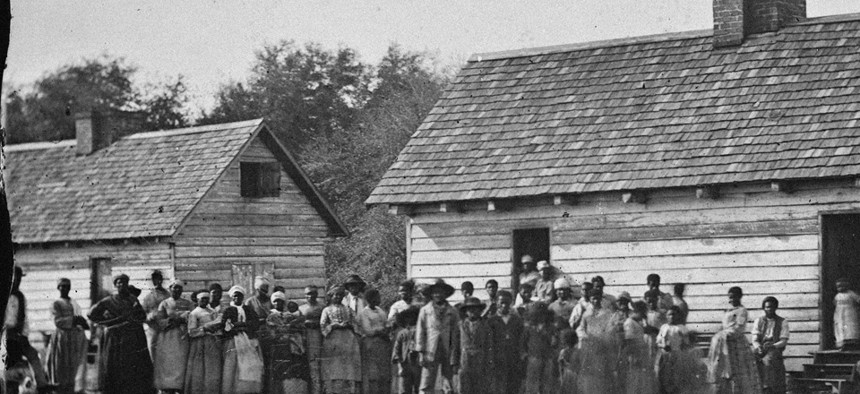
Library of Congress
The debate over the size of the federal government took a turn for the absurd this week, as former Sen. Jim DeMint, now head of the Heritage Foundation, found himself in the spotlight for mounting an argument that big government had nothing to do with ending slavery in the United States.
Appearing on a radio talk show, DeMint said “a lot of the move to free the slaves came from the people. It did not come from the federal government.” In fact, he said, the “real reason” the slaves were freed was the Constitution, which “kept calling us back to ‘all men are created equal and we have inalienable rights’ in the minds of God.”
In the end, DeMint insisted, “no liberal is going to win a debate that big government freed the slaves. In fact, it was Abraham Lincoln, the very first Republican, who took this on as a cause and a lot of it was based on a love in his heart that comes from God.”
There were a couple of problems here, as many commentators pointed out. The first is that the “all men are created equal” language DeMint highlights appears in the Declaration of Independence, not the Constitution. The second is that it’s a little hard to make the case that “big government” played no role in ending slavery when the federal government went so far as to mount a massive military operation against pro-slavery states and eventually undertook a series of executive, legislative and judicial actions that ultimately outlawed the practice in the United States.
“The federal government is never ‘bigger’ than in wartime, its powers never so expansive,” noted Andrew Sullivan. When that federal government is sending troops to conquer half the country, how much ‘bigger’ can it get?”
Peter Wehner, writing in Commentary, went a step further:
In the end, I would argue that conservatism and the cause of limited government are undermined by loose talk and an excessive animus toward the federal government. These days, in fact, conservatives would be well served to focus a good deal more attention on the purposes of government, not simply its size. I say that because during the Obama era the right has been very clear about what government should not be doing, or should be doing much less of, and for understandable reasons. But it has not had nearly enough to say about just what government should do.
That’s an important point. The debate over the sheer size of government is increasingly irrelevant. First of all, it’s very difficult to come up with an accurate measure of government’s size, and commonly used measures, such as the size of the government workforce or the federal budget, are subject to misinterpretation.
Fundamentally, we have a big government because we have a big country. What matters is what government does. On that front, there’s plenty of room for healthy debate over the extent to which we want governmental power to be exercised in areas ranging from fighting overseas wars to requiring Americans to purchase health insurance. But that debate is impeded, if not utterly stifled, by characterizing the options only in terms of “big” vs. “small.”
NEXT STORY: A Symbolic Victory for Open Office Setups







